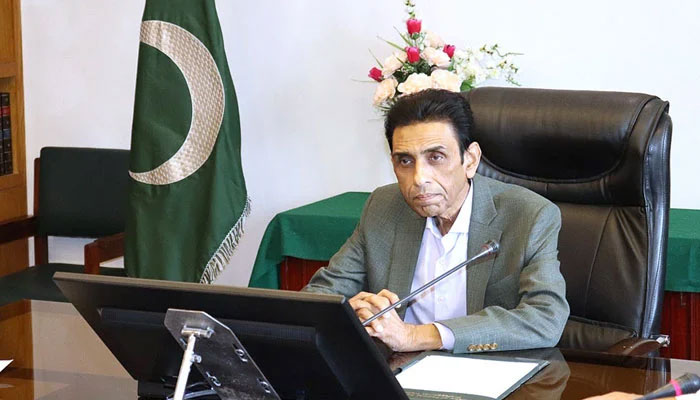SIFC ordered budget cut imperils higher education, warns education minister
Minister explains that funds allocated by federal government to public universities in Islamabad and provinces has remained stagnant at Rs65 billion since 2018
ISLAMABAD: Pakistan’s top investment body’s decision to cut state funding by Rs24 billion to public universities threatens the survival of higher education in the country, said the newly-appointed minister for federal education.
On Monday in a question and answer session in the National Assembly, Khalid Maqbool Siddiqui, the minister for federal education and professional training, was asked when the budget for public sector universities will be increased. In a written response, the minister explained that funds allocated by the federal government to public universities in Islamabad and the provinces has remained stagnant at Rs65 billion since 2018, even when the financial needs of universities have “drastically” increased against the allocated money, from 21% in 2018-19 to 45% in 2023-24.
Not only have grants not been boosted in the last six years, but the minister tells the lower house of the parliament that the Special Investment Facilitation Council’s (SIFC) decision on November 16 to further slash state funds to already cash-strapped universities is a serious risk to higher education. “In the current financial situation, the SIFC decision dated 16-11-2023 of reduction in federal allocation to provincial universities by Rs24 billion poses a severe threat to the survival of public sector higher education institutes,” the minister states. He then appeals to the National Assembly to support his request for a withdrawal of the SIFC’s order, as well as demand an increase in federal aid to public universities, which he adds is in the best interest of the younger population and the socio-economic development of the country. “The annual recurring demand for the financial year 2024-25 of public sector universities has been submitted to the federal government at an outlay of Rs125 billion,” he wrote in his reply.
The SIFC is a high-powered government body set up in June last year to attract foreign investments, particularly from Gulf nations. The body has both civil and military representation, including the prime minister and the chief of army staff.
Secretary says SIFC has nothing to do with educational budgets
However, Jameel Qureshi, the Islamabad-based secretary of the SIFC, denies that any budget reduction decision was taken by the investment body last year. “SIFC has nothing to do with educational budgets,” Jameel told Geo.tv, over the phone, “I don’t know where this news is coming from.” He added that recently the federal government did make “some cuts” in the government-bankrolled projects of the public sector development programs (PSDP), which were still in the planning stages, but these cuts were not specific to the education sector. Qureshi further rubbished claims that the SIFC was drafting a new education policy for the country. “SIFC is involved in education curriculum only to the extent of technical education to improve our skilled labour,” he said, adding that the export of highly skilled workforce will help Pakistan with remittances as well as bring the manufacturing industry to the country.
-
 Neve Campbell Explains Why She Avoids Watching Scary Movies As She Returns To 'Scream 7'
Neve Campbell Explains Why She Avoids Watching Scary Movies As She Returns To 'Scream 7' -
 Milan Tram Crash Leaves Two Dead, 39 Injured
Milan Tram Crash Leaves Two Dead, 39 Injured -
 Timothee Chalamet Touches On His Personality's Relatability With 'Marty Supreme' Role
Timothee Chalamet Touches On His Personality's Relatability With 'Marty Supreme' Role -
 Benny Blanco Explains Why His Feet Were Dirty During Podcast Debut
Benny Blanco Explains Why His Feet Were Dirty During Podcast Debut -
 Jake Humphrey Shares The Powerful Meaning Behind His Wrist Tattoo
Jake Humphrey Shares The Powerful Meaning Behind His Wrist Tattoo -
 Matthew Lillard Weighs In On His Return To The 'Scream' Franchise After Decades Of Persistence
Matthew Lillard Weighs In On His Return To The 'Scream' Franchise After Decades Of Persistence -
 Travis, Jason Kelce Share Blunt Dating Advice For Men: 'She's Gonna Hate You'
Travis, Jason Kelce Share Blunt Dating Advice For Men: 'She's Gonna Hate You' -
 Australia To Launch First High-speed Bullet Train After 50-years Delay
Australia To Launch First High-speed Bullet Train After 50-years Delay -
 Meghan Markle Turns To Desperate Bids & Her Kids Are Her ‘saving Grace’: Here’s What They’ll Do
Meghan Markle Turns To Desperate Bids & Her Kids Are Her ‘saving Grace’: Here’s What They’ll Do -
 King Charles Gives A Nod To Sister Anne's Latest Royal Visit
King Charles Gives A Nod To Sister Anne's Latest Royal Visit -
 Christian Bale Shares Rare Views On Celebrity Culture Urging Fans Not To Meet Him In Person
Christian Bale Shares Rare Views On Celebrity Culture Urging Fans Not To Meet Him In Person -
 Ariana Grande To Skip Actor Awards Despite Major Nomination
Ariana Grande To Skip Actor Awards Despite Major Nomination -
 North Carolina Teen Accused Of Killing Sister, Injuring Brother In Deadly Attack
North Carolina Teen Accused Of Killing Sister, Injuring Brother In Deadly Attack -
 Ryan Gosling Releases Witty 'Project Hail Mary' Ad With Sweet Reference To Eva Mendes
Ryan Gosling Releases Witty 'Project Hail Mary' Ad With Sweet Reference To Eva Mendes -
 Teyana Taylor Reveals What Lured Her Back To Music After Earning Fame In Acting Industry
Teyana Taylor Reveals What Lured Her Back To Music After Earning Fame In Acting Industry -
 Prince William Shows He's Ready To Lead The Monarchy Amid Andrew Scandal
Prince William Shows He's Ready To Lead The Monarchy Amid Andrew Scandal




